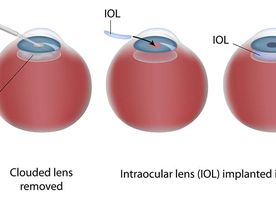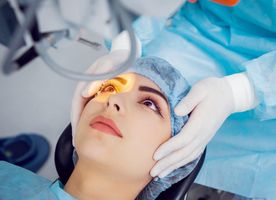Laser Eye Surgery (LASIK) in Singapore
Search and Compare the Best Clinics and Doctors at the Lowest Prices for Laser Eye Surgery (LASIK) in Singapore






Laser Eye Surgery (LASIK) at Gleneagles Hospital Singapore in Central, Singapore





Laser Eye Surgery (LASIK) at Mount Alvernia Hospital in Central, Singapore





Laser Eye Surgery (LASIK) at Mount Elizabeth Hospital in Central, Singapore




Laser Eye Surgery (LASIK) at Eagle Eye Centre Pte Ltd - Gleneagles in Central, Singapore




Laser Eye Surgery (LASIK) at Eagle Eye Centre Pte Ltd - Parkway East in Central, Singapore





Laser Eye Surgery (LASIK) at Farrer Park Hospital in Central, Singapore





Laser Eye Surgery (LASIK) at Parkway East Hospital in East, Singapore



Laser Eye Surgery (LASIK) at Dr Alicia Eye Specialist in Central, Singapore


Laser Eye Surgery (LASIK) at Specialist Eye and Eyelids Clinic - Main in Central, Singapore





Laser Eye Surgery (LASIK) at Specialist Eye and Eyelids Clinic - Suntec in Central, Singapore



Laser Eye Surgery (LASIK) at C. H. Low Eye Surgical Centre in Central, Singapore
Our partner clinics in are accredited by the following associations













































































































































No Time?
Tell us what you're looking for and we'll reach out to the top clinics all at once
WHY US?













































































































































No Time?
Tell us what you're looking for and we'll reach out to the top clinics all at once
What is LASIK?
LASIK (stands for laser-assisted in situ keratomileuses) is a surgical procedure to correct vision in people with a refractive error, including nearsightedness, farsightedness, and astigmatism. It is a type of refractive surgery, which involves reshaping the cornea to enable light that enters the eye to be correctly focused onto the retina so that your vision becomes clearer. The cornea is the transparent front part of your eye. It lets light into your eyeball and retina, allowing you to see.
A refractive error is a condition in which light does not focus on your retina the way it should, causing blurry vision. The basic types of refractive error that LASIK can correct are as follows:
- Nearsightedness (myopia) is a condition in which you see objects clearly when they are close to you, but objects farther away are blurry. This condition occurs because your cornea curves too sharply or your eyeball is somewhat longer than average, causing light rays to focus in front of your retina, blurring your distant vision.
- Farsightedness (hyperopia) is a condition in which you see faraway objects more clearly, but closer objects are blurry. This condition occurs when your eyeball is shorter than average, or your cornea is shaped too flat, causing light to focus behind your retina instead of on it.
- Astigmatism is a condition in which everything is blurry because your cornea flattens or curves unevenly. The focus of near and distant vision is disrupted.
With more than 28 million LASIK performed worldwide to date, it is one of the world's most popular laser vision correction procedures. It is also the most widely performed laser vision correction procedure in Singapore. LASIK is very popular because it offers numerous benefits. These include:
- Improved vision – studies have shown that around 96% of people who have LASIK achieve their desired vision, and around 85% achieve 20/20 vision or even better.
- No pain – one of the main reasons why LASIK is popular is because it only causes little to no pain! You will be given a numbing medication before the procedure starts, so you will not feel anything.
- Immediate and long-lasting results – the results of LASIK is almost immediate. You can expect to have significantly improved vision the day after surgery. The results of LASIK are expected to be permanent. If your vision changes over time while you age, adjustments can be made.
- Quick recovery – unless you work in an incredibly dusty or dirty workplace, you should be able to return to your regular schedule within a day following your surgery.
- No more contacts and glasses – most people who had LASIK have a dramatic reduction in eyeglass and contact lens dependence. Some people may no longer need them at all. This means that you can participate in activities that you couldn't do before because of your eyeglass, such as sports. You also do not have to keep buying contact lenses, contact solutions, and frames, which can add up in time so that you can save money in the long run.
What are the advantages of getting LASIK in Singapore?
It is estimated that around 500,000 medical tourists visit Singapore each year, many of which choose this country to undergo LASIK. LASIK in this country is so popular that you can even find numerous discussions about LASIK in Singapore on Reddit. LASIK in Singapore is also talked about in many forums as more and more people are considering to get their procedure here. This Southeast Asian country is a preferred destination for LASIK for many reasons. Some of the main reasons are:
- Excellent healthcare system – Singapore boasts ultra-high quality levels in healthcare and world-class facilities. In fact, it has one of the most efficient health systems in the world. Many hospitals in the country have international accreditation from the Joint Commission International (JCI), OHSAS, and ISO. The country's hospitals also receive local accreditation from the Singapore Health Promotion Board, the Singapore Laboratory Accreditation System (SINGLAS), the Singaporean Ministry of Health, and the Singapore Accreditation Council (SAC). For instance, the National University Hospital (NUH) offers LASIK and is accredited by JCI, ISO, and SAC.
- World-class medical centers – the excellent healthcare system that Singapore has to mean that the medical centers in the country offer top-notch quality. Many hospitals in the country are equipped with the most advanced technology for LASIK, such as LASIK with femtosecond laser and iLASIK. These medical centers also offer first-class facilities, ensuring patients have the most comfortable experience.
- Lower costs of LASIK – Singapore is not the most affordable place to go for medical treatments, especially when compared to other Asian medical tourism destinations. However, compared to many Western countries, such as the United States and the United Kingdom, the cost of LASIK can be 20% to 30% lower.
- English is widely spoken – Since English is one of Singapore's official languages, all doctors and medical staff can speak the language. You don't have to worry about language barriers.
Can anyone get LASIK performed in Singapore?
Not everyone can get LASIK in Singapore. As in other parts of the world, there are several requirements that you have to meet to be a candidate for LASIK. Below are some of the requirements to get LASIK in Singapore:
You have to be at least 18 years of age
Like every other organ in your body, eyes grow and are affected by the hormonal changes children go through when they start puberty. Having LASIK before your eyes are fully formed can reduce the long-term result of LASIK. Note that you need to have parental consent if you are below 21 years old.
You have stable vision over 12 months prior to surgery
The results of LASIK will be better if you have stable vision and a prescription that you have not needed to change. If you need to change prescription every 12 months or so, the chance of you getting disappointing results is higher.
You have healthy eyes
LASIK is generally more appropriate for people with a moderate degree of refractive error, although there are certain types of LASIK machines that are very precise and allow doctors to work on people with high levels of nearsightedness. In general, your nearsightedness should not be more than 1000 degrees, farsightedness should not be more than 400 degrees, and astigmatism should not be more than 400 degrees.
In addition, you may not be eligible for LASIK if you have unusual vision problems. Your surgeon will ask you a detailed question about your eye health to ensure that you do not have any conditions that might result in poor outcomes or complications. Some of these conditions are keratoconus, keratitis, uveitis, eye injuries, dry eyes, glaucoma, cataracts, and large pupils.
You have no significant medical condition.
You need to be generally healthy in order to undergo LASIK. Although they are unrelated to your eyes, certain medical conditions can increase the risk associated with LASIK or make the outcome disappointing. These medical conditions include diabetes, depression, certain chronic pain conditions (migraine, irritable bowel syndrome, fibromyalgia), and any condition affecting your immune system. You may also need to rethink undergoing LASIK if you take immunosuppressive medication for any reason.
Not pregnant or breastfeeding
Since pregnant and breastfeeding women undergo significant hormonal changes throughout their body, including their eyesight, they are not the best candidate for LASIK. Sometimes, pregnant women may need to change their glasses prescription, but this change may be temporary.
What happens after my LASIK procedure in Singapore?
Immediately after LASIK, your surgeon will have you rest for a while in the hospital until the anesthetic wears off. You may feel a temporary itching or burning sensation following the procedure. Your surgeon or medical team may perform a brief post-operative exam to determine whether you can leave the hospital or not.
If everything is alright, you should be allowed to leave the hospital right away. However, you should not leave Singapore on the same day as your procedure. It is recommended that you stay in the country for around 3 to 5 days for initial recovery and attend a follow-up checkup. During the follow-up checkup, the health of your eye and your visual acuity will be evaluated.
The good news is, most people can return to work and some light activities within the next day or after one day of rest. This means that you should be able to enjoy a fantastic holiday in Singapore before you travel back home. However, remember that you are still recovering, and there may be some restrictions to your activities, so make sure to talk to your doctor first before you travel around Singapore.
You also need to refrain from any strenuous activities and avoid eye makeup for at least seven days as it can affect your healing and traumatize your eyes. Activities like swimming, water sports, and contact sports should be avoided for about a month.
You may need to wear a protective eye shield while sleeping to protect your eyes for at least three days following your surgery. Your surgeon may also prescribe medicated eye drops. Make sure to use it as directed.
In general, most patients can see immediately after surgery and recover around 75% to 80% of their vision the next day, but full visual recovery occurs typically in a week. However, it may take around 1 to 2 months until your vision fully stabilize.
What are the risk and side effects of LASIK in Singapore?

LASIK has been around for over 25 years. It has been approved and proven safe and effective many times. It is also very accurate, with around 96% of patients achieve their vision goals after LASIK. Its safety and effectiveness continue to improve alongside the advancement of technology. For instance, the laser's computer used in LASIK uses a tracking system to monitor the position of your eye, so even if you blink or you accidentally move your body, the laser will not hurt you.
Still, with advanced technology and experience, there are still some possible risks and side effects that you need to be aware of. These include:
- Dry eyes – this is the most common side effects of LASIK caused by the creation of the corneal flap, which results in the cutting of the corneal nerves. These nerves are responsible for the normal production of tears. However, this condition should resolve within a few months.
- Discomfort and itchiness – this is a part of the healing process and usually goes away within a few hours following the procedure.
- Night vision issue – you may temporarily see starburst, halos, or glares at night time, particularly if you have a high level of myopia or astigmatism. Your night vision will gradually improve within nine to twelve months after your surgery.
- Thinning cornea – although it is very rare, it does happen. Your cornea can become irregular and unstable after LASIK. This is known as post-LASIK ectasia.
- Inaccurate eye pressure readings – LASIK makes reading your eye pressure more of a challenge, which leads to a lower reading.
- Regression – the improvements after LASIK is permanent, but in some cases, your old eyesight may return.
- Problems with cataract surgery in the future – cataract surgery involves replacing the lens in your eye with an artificial one. Since LASIK changes your cornea permanently, the lens calculations can be complicated because it needs a normal cornea for correct reading. Therefore, if you had cataract surgery after LASIK, you may need to wear glasses.
How much does LASIK Surgery in Singapore cost?
The cost of LASIK surgery in Singapore varies, usually depending on the clinic's technology to perform the procedure. Some medical centers may use less advanced machines, which may cost less. The average LASIK in Singapore price in 2020 is around $3,000 to $4,500, although some clinic offers as low as $2,400. For example, Eagle Eye Center offers LASIK for $2,404, and this clinic is known as one of the best private clinics for LASIK in Singapore.
Singapore National Eye Center (SNEC) offers LASIK and have many amazing reviews. It is a popular public institution in Singapore to undergo this type of eye surgery. SNEC LASIK price varies between $2,364 and $3,531. LASIK installment plans are available in Singapore. Many clinics do offer a monthly installment payment option with 0% interest over six to twelve months.
What if I am not a candidate for LASIK, are there alternative treatments?
If you are not a candidate for LASIK, you may consider other types of laser eye surgeries. These include Advanced Surface Ablation (PRK, Epi-LASIK, LASEK, and TransPRK) and ReLEx SMILE.
- Advanced Surface Ablation, or ASA, is a group of procedures that include PRK, Epi-LASIK, LASEK, and TransPRK. It is a no-flap, no incision, a surface-based procedure that is ideal for those who have an active lifestyle and into contact sports, those with thinner corneas, and those with concern over flap-related issues from LASIK.
- ReLEx SMILE, or Refractive Lenticule Extraction – Small Incision Lenticule Extraction, is a flapless and minimally invasive procedure. This technique combines the benefits of LASIK and ASA. It is suitable for those who engage in sports or those whose occupation entails some risk of eye or head trauma.
This information has been accurately sourced and verified by a medical professional for its accuracy, however, we strongly recommend you to consult with your doctor before pursuing medical procedures overseas.





























